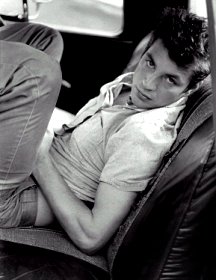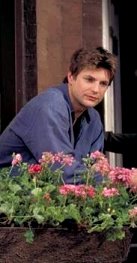News - Feature Stories - Magazine
- Gale Harold
Gale Force
 The
craft of acting struck Harold in a way that two-dimensional media didn’t.
Waiting tables to support himself, he studied, he says, “to the exclusion
of everything else, for a solid year and a half.” A manager who’d
seen him in a play signed him. For a year, Harold made the actor’s boot
camp round of auditions. Nothing clicked. At one point he asked his manager
to stop sending him out for television work, sure that there was nothing for
him in that medium. Then, of course, came Brian.
The
craft of acting struck Harold in a way that two-dimensional media didn’t.
Waiting tables to support himself, he studied, he says, “to the exclusion
of everything else, for a solid year and a half.” A manager who’d
seen him in a play signed him. For a year, Harold made the actor’s boot
camp round of auditions. Nothing clicked. At one point he asked his manager
to stop sending him out for television work, sure that there was nothing for
him in that medium. Then, of course, came Brian.
By the time we head over to the QAF production office to continue
our conversation, Harold is ready to talk about his controversial on-screen
character. “There was an attraction,” he concedes, when asked if
the chance to play a sexual hunter-gatherer like Brian Kinney—as far from
the “gay upstairs neighbor” as possible—appealed to him. “Another
attraction was that it was an interesting story. It wasn’t West Hollywood,
90210, which I would never have been called in for. I’m not that ‘type.’”
Harold’s initial take was that the character would best
be played as “a cross between Lou Reed and Oscar Wilde, with a gold tooth,
and go completely over the top with it. Now we know that I can’t do that,”
he says mischievously, “though I still think that’s how it should
be done. It would be a lot dirtier. But he’s not allowed to be that.”
Nor does he buy into the notion that Brian is a pure predator. “You have
to like your character, because if you don’t, no one else will either.
And if the point of the show is to create a character that nobody likes and
everybody hates, that would be the way to go. Make him a predator. But I liked
Stuart [the character on whom Brian is based]! I liked the guy.”
 The
thought that he might be typecast playing a gay man never occurred to him when
he considered whether or not to take the role. He had asked a gay actor friend
whether he should accept the part, not because of Brian’s sexual orientation
but because of the show’s merit. “If you want to be an actor,”
his friend told him, “then act.”
The
thought that he might be typecast playing a gay man never occurred to him when
he considered whether or not to take the role. He had asked a gay actor friend
whether he should accept the part, not because of Brian’s sexual orientation
but because of the show’s merit. “If you want to be an actor,”
his friend told him, “then act.”
“There was the creative impulse and the chance to do something,”
Harold says honestly, “but there was also $1,400 worth of parking tickets
and back registration on my truck.” As he owed money to friends and back
rent to landlords, the pragmatist in Harold knew it was time to grow up. “I’d
been through the ‘hangdog barely making it’ thing over and over
again. Your options run out.” Looking back, he says, he realizes that
“the only difference between me now and me then, aside from the experience
I’ve gained working on the show, is that I have money. That I’m
able to support myself and pay off my student loans. And the ability to make
things right with people over time. That becomes a really important thing as
you turn 30.”
This brings up one of those boilerplate questions Harold dislikes:
Is he at all worried that his role in Queer as Folk might negatively affect
his professional future? His answer is swift.
Page 1
. 2 . 3
. 4 . [5] . 6
 The
craft of acting struck Harold in a way that two-dimensional media didn’t.
Waiting tables to support himself, he studied, he says, “to the exclusion
of everything else, for a solid year and a half.” A manager who’d
seen him in a play signed him. For a year, Harold made the actor’s boot
camp round of auditions. Nothing clicked. At one point he asked his manager
to stop sending him out for television work, sure that there was nothing for
him in that medium. Then, of course, came Brian.
The
craft of acting struck Harold in a way that two-dimensional media didn’t.
Waiting tables to support himself, he studied, he says, “to the exclusion
of everything else, for a solid year and a half.” A manager who’d
seen him in a play signed him. For a year, Harold made the actor’s boot
camp round of auditions. Nothing clicked. At one point he asked his manager
to stop sending him out for television work, sure that there was nothing for
him in that medium. Then, of course, came Brian. The
thought that he might be typecast playing a gay man never occurred to him when
he considered whether or not to take the role. He had asked a gay actor friend
whether he should accept the part, not because of Brian’s sexual orientation
but because of the show’s merit. “If you want to be an actor,”
his friend told him, “then act.”
The
thought that he might be typecast playing a gay man never occurred to him when
he considered whether or not to take the role. He had asked a gay actor friend
whether he should accept the part, not because of Brian’s sexual orientation
but because of the show’s merit. “If you want to be an actor,”
his friend told him, “then act.”